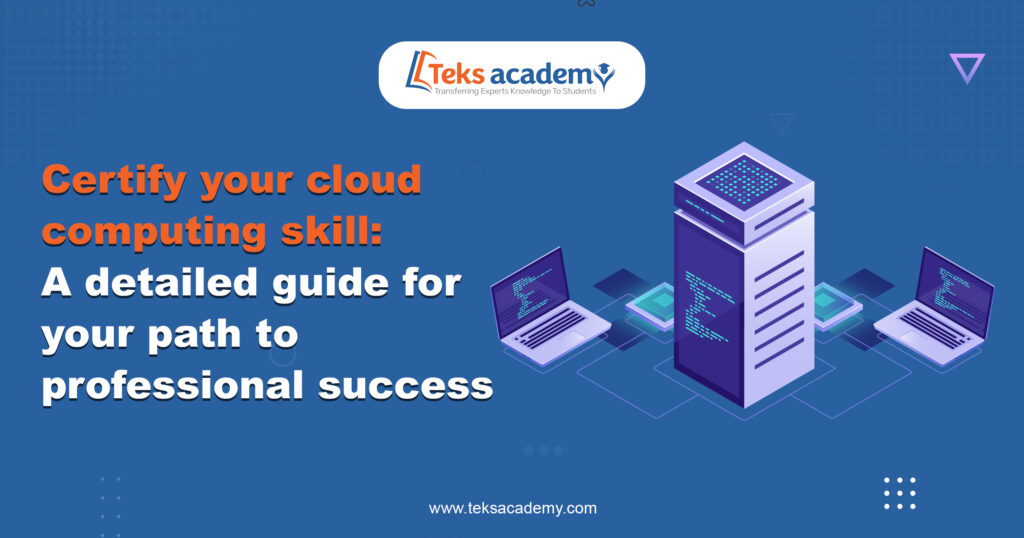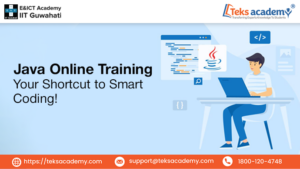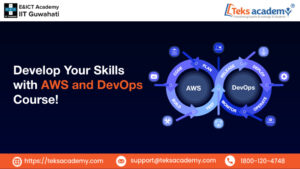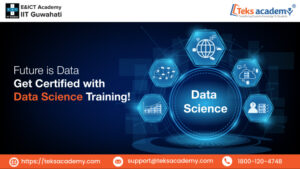Cloud computing has become a major force that is changing the way businesses and people work in today’s digital world, which is changing quickly. The need for skilled workers who have done real-world work with cloud computing has grown.
This guide will walk you through the world of cloud computing training for AWS, Azure, and AWS DevOps. This guide will give you the information and tools you need to succeed in this fast-paced field, whether you are new to cloud computing or an experienced IT worker who wants to move up in your job.
Let’s dive into the detailed guide and unlock the many choices that will take you to the world of cloud computing.
What is cloud computing?
Cloud computing is the process of providing various services like storage services, computing applications, servers, development tools, and many more.
Cloud computing removes the expenses of hardware and software. They provide high-speed delivery services and improve the productivity of businesses.
Types of cloud computing services:
Some of the available cloud computing services are mentioned below:
- Microsoft Azure
- Saas
- Google Cloud
- Amazon Web Services
- Salesforce
- IBM Cloud
- Alibaba Cloud
- Digital Ocean.
What is AWS?
There are many cloud computing organizations that offer many services, such as Microsoft Azure, Amazon AWS, and Google Cloud. Cloud computing services let you do things like store and edit large amounts of data and get to them from anywhere. AWS and other cloud providers make it simple to store large volumes of business data online in a secure manner, eliminating the need to store them in physical locations and thereby saving enormous amounts of money and space.
To know more about the basics of AWS and a career pathway in AWS, read our blog “Amazon Web Services: A guideway for beginners to become professionals.” for more information.
AWS and its certifications:
With the help of a certification in AWS, you can uncover numerous opportunities where your skills will be validated by the most recognizable organization. These certifications create a common understanding of the level of your expertise in cloud and web development that helps you grow toward success.
The AWS certification itself is a more widely accepted and appreciated certification that evaluates a candidate’s skills. This showcases the hands-on experience of the candidate with the help of AWS Certification. Certification in AWS for working professionals strengthens their knowledge and gives them clarity over every concept. A new starter’s AWS certification gives them the foundational knowledge and skills that are required to work with Amazon Web Services.
The list of AWS certification and their scope:
Amazon Web Services currently provides 12 types of certifications that consist of the following level
- Foundational certification
- Associate level certification
- Professional level certification
- Specialized certification
Let’s view every certification in detail with their pathway for the future.
AWS Certified Cloud Practitioner:
The Certified AWS Cloud Practitioner (CLF-C01) is suitable for beginners who require a basic to general understanding of the workings of Amazon Web Services. This is one of the foundational certification courses for beginners. People who have six months of AWS cloud experience can pursue this course.
What will you learn?
- Basic understanding of AWS principles.
- Common use cases of AWS.
- Benefits of AWS cloud.
- Deployment and operating principles of the core.
- Economics and billing practices of the cloud.
- Basic security and compliance model.
AWS Certified Solutions Architect – Associate:
A certified solutions Architect-Associate (SAA-C03) is the Associate level certification that helps you in experiencing distributed design. Candidates may demonstrate their ability to design, administer, and implement applications utilizing AWS platform tools and services.
What will you learn?
- How to work in AWS and Network Technologies.
- The working of AWS-based applications and the connection of client interfaces to the AWS platform.
- How to build a secure application on the AWS platform.
- How to deploy hybrid systems and AWS components.
- Design of reliable, scalable, and performant systems.
- Data security practices in AWS.
AWS certified developer Associate:
This is an associate-level certification that helps in developing and maintaining AWS applications. This certification teaches you how to write code for AWS software to access AWS applications.
What will you learn?
- Basic understanding of AWS Architecture and services.
- A handful of experience in deploying, debugging, and maintaining applications.
- Applications utilized for AWS services like AWS databases, workflow services, and services for storage.
AWS Certified SysOps Administrator:
This is an Associate level AWS certified course that helps in gearing your entire knowledge towards system administrators. This certification gives conceptual knowledge and expertise of the operation of the AWS platform.
What will you learn?
- How to deploy applications across various architectures.
- How to send and receive data between data centers and VPC architectures.
- Selection of AWS services according to the organizational needs.
- Secure and manage systems in AWS
AWS Certified Solutions Architect – Professional:
This is one of the professional certifications in AWS where the AWS Solution Architect professional evaluates the organization’s requirements and gives recommendations for the architecture. This requires a higher level of technical skill in AWS applications.
To pursue this certification, one must have hands-on experience in designing and deploying cloud architecture on AWS.
What will you learn?
- How to create architecture to scale the application on AWS.
- Recommendation of the right AWS service for fault-tolerant and reliable application.
- How to migrate architectural design across AWS to multi-tier platforms.
- Creation of strategy for cost optimization.
AWS Certified DevOps Engineer:
DevOps Engineers are experts in AWS application provisioning, operation, and management. Two mainstays of the DevOps paradigm – continuous delivery (CD) and process automation – are given thorough coverage in this certification.
A better understanding of modern applications, provisioning, and managing AWS applications is recommended before learning this certification.
What will you learn?
- Basics of Continuous Delivery methodologies.
- Implementation and management of Continuous Delivery Systems.
- Setting up logging systems, monitoring, and security controls.
- Implementation of Self-healing systems on AWS.
- Management of automation tools for production operations.
AWS Certified Data Analytics:
This certification is suitable for those who are specialized in data analytics and have experience in the design and architecture of AWS data. This certification helps in validating the candidate’s experience by extracting value from data using AWS services.
What will you learn?
- Creation of architectures for implementation of core AWS.
- Visualizing, designing, and maintaining data.
- Automated data analysis with AWS.
- Data analytics security solutions.
- Study of AWS Services: Athena, Quicksight, and Rekognition.
AWS Certified Advanced Networking:
The AWS advanced networking certification is designed to evaluate a candidate’s experience in performing complex networking tasks on AWS. Candidates who have a firm background in architecture and implementing network solutions can learn this advanced course.
What will you learn?
- Cloud planning and development using architectural practices.
- Helps to increase the number of network deployments across Amazon Web Services.
- Planning and execution of network optimization and troubleshooting.
AWS Certified Security:
This certification is a separate specialization that helps to master security fundamentals and develop unique and deep knowledge of the AWS platform. This certification validates your AWS Knowledge in data protection, encryption, incident response, and access management.
What will you learn?
- Learn to select the right level of security for your deployments and data security in AWS.
- Provide the most appropriate data protection solutions and encryptions.
- Learn to identify the security flaws and weaknesses in the infrastructure.
AWS Certified Machine Learning:
The AWS-certified Machine Learning validates your ability to create, maintain, and implement machine learning solutions for a wide range of business solutions. The certification is intended for those who work in data science or software development. Candidates should have experience in ML or deep learning of AWS cloud with one year of experience is recommended to pursue this certification.
What will you learn?
- How to provide business solutions using the ML approach.
- Identify the relevant AWS Solutions to deploy ML.
- Design and implement cost-optimized ML solutions.
AWS Certified Database:
This is a specialized certification that gives the learners an overall comprehension of the AWS database services and improves the business with the help of optimized integration. This certification is suitable for candidates who have hands-on experience in providing excellent DB solutions.
Candidates with at least two years of experience in AWS cloud and NoSQL databases can take this certification.
What will you learn?
- Monitoring and troubleshooting
- Deployment and migration
- Database design
- Security
- Management and operations
AWS Certified SAP:
One of the new certifications in AWS helps to demonstrate the critical knowledge about SAP solutions and workloads of the AWS cloud. This will give me more hands-on experience on the SAP platform.
What will you learn?
- Helps you to create an SAP solution that works on the AWS cloud
- Implementation and migration of SAP workloads on AWS.
- Operation of SAP workloads on AWS.

Microsoft Azure and its certifications:
We request you to learn more about Azure and the career pathway in Microsoft Azure from our blog “From Beginner to Expert: A Step-by-Step Guide to Improve Your Career in Microsoft Azure” before learning about the certifications in Microsoft Azure.
Microsoft Azure gives various certifications depending on the role and job title you hold in cloud computing. There are various job titles available, such as Azure Solution Architect, Azure Developer, Azure AI Engineer, Azure Developer Associate, etc. Primarily, Azure roles are organized into four categories, which are listed below.
- Fundamentals.
- Associate.
- Expert.
- Specialty.
Every certification focuses on building the knowledge and skills that help to level up your career in cloud computing.
What is Microsoft Azure?
Azure is a platform for cloud computing and an online portal that lets you use and control Microsoft’s cloud services and resources. With these services and resources, your info can be stored and changed based on your needs. You only need an active internet connection and the ability to connect to the Azure portal to get access to their tools and services.
Here is a list of Microsoft Azure certifications that will give you an idea of the different kinds of jobs you can do.
Microsoft Azure Fundamentals Certification:
Azure Fundamentals – AZ-900:
Azure Fundamental Certification gives you foundational knowledge that validates your learning and the skills you develop in the cloud computing industry. Beginners and experienced users who are looking to develop a strong foundation in cloud computing can pursue this certification through Azure online courses.
What will you learn?
- A thorough understanding of cloud computing concepts gives you high reliability, scalability, availability, and types of computing services available.
- A greater understanding of storage, networking, and core architectural components of Azure.
- How to access, identify, and provide security.
- Get a detailed understanding of monitoring tools, management, governance, and tools that are used to monitor.
Azure AI Fundamentals Certification – AI-900:
To take the Azure AI Fundamentals Certification, candidates need to clear the AI-900 certification. The major difference between AZ-900 and AI-900 is the basic knowledge of the Artificial Intelligence and Machine Learning solutions added to the AI-900 certification.
What will you learn?
- Deep understanding of AI workloads and their considerations along with guiding principles.
- Learning of fundamental principles of Machine learning that are used in Azure.
- Cloud-based computer vision tasks.
- Usage of Natural Language Processing (NLP) in Azure.
Azure Data Fundamentals Certification – DP-900:
To pursue and get this certification, a candidate must have a basic understanding of Azure. This certification provides knowledge about the core concepts of Azure cloud computing, analytics workloads, and non-relational data.
What will you learn?
- Deep understanding of core concepts and common workload data.
- How to identify the relational data and relational concepts on Azure.
- How to work on non-relational data on Azure that includes capabilities of Azure Cosmos DB.
- How to describe workloads on Azure that includes large-scale data analytics, real-time data visualization in Microsoft Power BI.
Security, Compliance, and Identity Fundamentals – SC-900:
The SC-900 is the entry-level cyber security exam that addresses a thorough understanding of security, compliance, and identity in Azure to protect users. Learners will be familiarized with concepts like “zero trust, data residency, and shared responsibility.
What will you learn?
- Core concepts of Security, compliance, and identity.
- Understand Azure Active Directory.
- Capabilities of Microsoft security and compliance solutions.
Associate Level Certifications:
Azure Administrator Associate Certification – AZ-104:
The certification provides you with details about the administrator’s core responsibilities, how to implement the Azure cloud system, and coordination with other stakeholders to deploy DevOps solutions.
Learners will gain a deeper understanding of virtual networks, the adjustment of resources, provisioning, and monitoring identity.
What will you learn?
- Hands-on experience with Azure Active Directory (AD).
- How to implement and manage Azure files and Azure Blob storage.
- How to deploy Azure compute resources, and Azure App Service.
- How to configure virtual networks and load balancers.
- How to utilize Azure Application gateway.
Azure Developer Associate Certification – AZ – 204:
Azure cloud architects who want to boost their knowledge of Azure Development Solutions can pursue this certification. Learners will learn in-depth attributes of Azure app services, server less architectures, and microservices-based architectures.
The Azure Developer Associate Certification is particularly useful for those who are interested in the design and deployment of Azure cloud services. To become successful in this certification, candidates must have a minimum of 2 years of experience along with proficiency in data storage and connections.
What will you learn?
- How to develop Azure computing solutions that include IaaS and Azure functions.
- How to develop Azure Cosmos DB and Blob storage.
- Implementation of security that includes authorization and authentication.
- How to control, improve, and analyze Azure Services.
- How to connect and consume Azure services using event and message-based solutions.
Azure Security Engineer Associate Certification – AZ-500:
Learners who want to learn the implementation and management of security controls and access management can pursue the Azure Security Engineer Associate Certification. The Azure Security Engineer is responsible for managing cloud-based solutions.
This exam requires proficiency with automation and scripting, virtualization technology and networking, and Microsoft cloud services and products.
What will you learn?
- How to manage identity and access with the help of role-based access control (RBAC).
- How to implement platform protection that includes advanced security.
- Deep understanding of security operations and policy management, and security monitoring solutions.
- How to secure data and applications.
Azure Network Engineer Associate Certification – AZ-700:
The Azure Network Engineer Associate Certification helps professionals design and deploy the best networking solutions for their businesses. This certification is suitable for people who have experience in Microsoft Azure networking.
What will you learn?
- How to manage and implement hybrid networking.
- Design and implementation of core networking infrastructure, and routing.
- Secure and monitoring of networks.
- How to implement and design access to Azure services in private.
Azure AI Engineer Associate Certification – AI-102:
The AI Engineer Associate Level Certification is designed for learners who need to implement AI languages like natural processing language, and bots using Cognitive services and search.
What will you learn?
- How to plan and manage Azure Cognitive Solutions.
- Implementation of natural language processing solutions.
- Implementation of knowledge-mining solution.
- How to implement computer vision solutions.
- Implementation of conversational AI solutions.
Azure Data Scientist Associate Certification – DP-100:
The Data Scientist certification in Azure helps the learners gain knowledge in data science and machine learning that helps them run machine learning on Azure. Learners will learn how Azure machine learning is used to approach evaluation, training, and other deployment models to solve business problems.
What will you learn?
- How to design and prepare a machine learning solution.
- How to explore data and train models.
- Prepare a model for deployment.
- Deploy and retain a model.
Azure Data Engineer Associate Certification – DP-203:
The Azure Data Engineer Associate is an advanced-level certificate exam that helps learners develop their analytical skills in transforming, integrating, and consolidating data from various systems. The certification helps in exploring, analyzing, and processing data on Azure.
What will you learn?
- Design and implement data storage and data security on Azure.
- Design and implement data processing on Azure.
- How to monitor and optimize data storage and processing on Azure.
Azure Database Administrator Associate Certification – DP-300:
The Administrator Associate Certification is suitable for learners who are interested in the administration of cloud-based database systems. The candidates involved in the management of Azure data services and SQL Server
What will you learn?
- How to implement data platform services.
- Implementation of secure services.
- How to monitor, configure, and optimize database services.
- How to configure and manage the automation tasks.
- How to plan and configure the disaster recovery (HA/DR) environment.
Azure Security Operation Analyst Associate Certification – SC-200:
The certification is suitable for IT professionals who need to upgrade their skills in the mitigation of cyber threats using Microsoft Defender and Sentinel.
What will you learn?
How to mitigate threats using Microsoft 365 Defender, Microsoft Defender for Cloud, and Sentinel.
Azure Security Identity and Access Administrator Associate Certification – SC-300:
The Security Identity and Access Administrator Certification help the learner manage and implement an authentication and access management solution.
What will you learn?
- How to implement identity in Azure AD.
- How to implement authentication and access management.
- How to implement access management for applications.
- How to plan and implement governance in Azure AD.
Azure Expert-Level Certifications:
Azure Solutions Architect Expert Certification – AZ-305:
Candidates need to pass both AZ-305 (Azure Solutions Architect Expert) and AZ-104 (Azure Administrator Associate Exam) to get certification in this expertise. The certification is intended for candidates with knowledge of Azure Architecture.
What will you learn?
How to design data storage solutions, infrastructure solutions, identity, governance, monitoring solutions, and business continuity solutions.
Azure DevOps Engineer Expert Certification – AZ-400:
Candidates must pass either AZ-104 (the Azure Administrator Associate Exam) or AZ-204 (the Azure Developer Associate Exam) to get certified as an Azure DevOps Engineer Expert. The exam is suitable for DevOps professionals who deliver business-valued services and products. DevOps engineers are accountable for the delivery of cloud services by improving the design and implementation of app development strategies, monitoring, and automation of delivery services.
Learners should be proficient in Azure development and operation processes.
What will you learn?
- Implementation of identity management solution.
- Implementation of authentication and access management solution.
- Planning and implementation of identity governance strategy.

AWS services for DevOps:
AWS DevOps is a technology that enables businesses to implement DevOps with the aid of the various services, features, and tools provided by this cloud platform. With the assistance of AWS and DevOps, organizations can develop and deliver their products more reliably and quickly by utilizing a variety of flexible services provided by AWS. AWS services for DevOps offer features that facilitate a variety of business processes, including application monitoring, infrastructure management, software release automation, application code deployment, etc.
We request you to read our blog “How a certification in AWS DevOps helps you improve your career”, before reading further about AWS DevOps for more clarity.
Types of computing services in AWS DevOps:
AWS DevOps technology helps organizations to provide continuous integration and delivery services. This helps in deploying, developing, and testing the applications in every environment.
The three main types of AWS DevOps cloud computing are:
- Platform as a Service (PaaS)
- Infrastructure as a Service (IaaS)
- Software as a Service (SaaS)
Skills and certification to become a DevOps Engineer:
To become a DevOps Engineer, here are the things you should consider while pursuing your career path.
Required skills for AWS DevOps Engineer:
To become an AWS DevOps Professional, you’ll need a lot of knowledge in software development, cloud computing, and infrastructure management. You’ll also need experience with configuration management tools like Ansible, and Puppet, as well as an understanding of scripting languages like Python, Bash, or Ruby. It’s also important to have good conversation skills and be able to work well with others.
Required certification:
A Bachelor’s degree in Computer Science or a related qualification is most suitable for an AWS DevOps Engineer role. A candidate should have Amazon Web Services (AWS) certification along with experience in DevOps tools like Kubernetes and Jenkins.
Certification in AWS DevOps:
The AWS Certified DevOps Engineer (DOP-C01) certification exam gives more advantages and is mandated to become a DevOps Engineer. The exam assesses the candidate’s application management capability in every aspect. In order to clear the AWS DevOps exam, you should have experience in the following skills:
- Experience in high-level programming language coding.
- A basic understanding of modern development procedures.
- Know about delivery systems and procedures.
- Skills in monitoring security controls, processes, and compliance.
- Able to deploy monitoring and logging systems.
How to start your career after AWS DevOps (DOP – C01) certification?
This is a very important step to take if you want to get a good job in the market. That is to say, no company can turn you down if you have the right skills and an AWS DevOps (DOP-CC01) certification. And the best way to do that is by starting to work on a project. Start working on your own project using the skills and knowledge you gained while taking the DevOps Engineer Professional test. This could also be used as a task to test your skills or as a plus during the interview to show the company what you can do.

In a nutshell:
If you want to be more successful in the cloud computing industry, the certifications listed here will help you choose certifications and courses that will help you move up your job ladder.
So, use what you’ve learned in this guide to set goals for the certifications that will help you get to where you want to be in your work. With the right certifications, hard work, and passion, you could do amazing things and build a successful and fulfilling job in the cloud computing business, which has a lot of opportunities. Get your cloud computing certification today and open up a world of opportunities.






